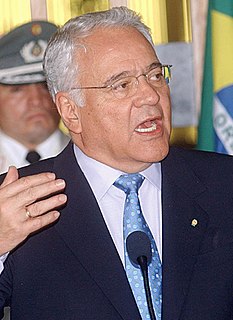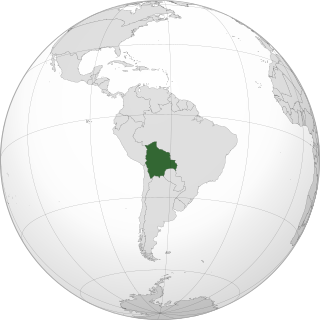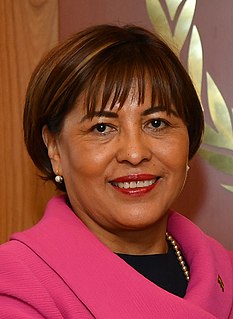
The politics of Bolivia takes place in a framework of a presidential representative democratic republic, whereby the president is head of state, head of government and head of a diverse multi-party system. Executive power is exercised by the government. Legislative power is vested in both the government and the two chambers of parliament. Both the Judiciary and the electoral branch are independent of the executive and the legislature. After the 2014 election, 53.1% of the seats in national parliament were held by women, a higher proportion of women than that of the population.

Gonzalo Sánchez de Lozada y Sánchez de Bustamante, familiarly known as "Goni", is a Bolivian politician and businessman, who served as President of Bolivia for two non-consecutive terms. He is a lifelong member of the Movimiento Nacionalista Revolucionario (MNR). As Minister of Planning in the government of President Víctor Paz Estenssoro, Sánchez de Lozada used "shock therapy" in 1985 to cut hyperinflation from an estimated 25,000% to a single digit within a period of less than 6 weeks.

Tarija or San Bernardo de la Frontera de Tarixa is a city in southern Bolivia. Founded in 1574, Tarija is the largest city & capital and municipality within the Tarija Department, with an airport offering regular service to primary Bolivian cities, as well as a regional bus terminal with domestic and international connections. Its climate is semi-arid (BSh) with generally mild temperatures in contrast to the harsh cold of the Altiplano and the year-round humid heat of the Amazon Basin. Tarija has a population of 234,442.

The Movement for Socialism–Political Instrument for the Sovereignty of the Peoples, alternately referred to as the Movement Toward Socialism or the Movement to Socialism, is a Bolivian left-wing populist and indigenist political party led by Evo Morales, founded in 1998. Its followers are known as Masistas.

Municipalities in Bolivia are administrative divisions of the entire national territory governed by local elections. Municipalities are the third level of administrative divisions, below departments and provinces. Some of the provinces consist of only one municipality. In these cases the municipalities are identical to the provinces they belong to.

The following is an alphabetical list of topics related to the Republic of Bolivia.
Rugby union in Bolivia is a minor, but growing sport.

The 2010 Bolivian regional elections were held on 4 April 2010. Departmental and municipal authorities were elected by an electorate of approximately 5 million people. Among the officials elected are:
Óscar Zamora Medinaceli was a Bolivian politician and lawyer. A communist student activist in his youth and leader of a failed Maoist insurgency in the 1970s, Zamora Medinaceli went on to become a senator, minister, mayor, ambassador and prefect.

The Revolutionary Left Front is a political party in Bolivia, founded in 1978.
The first Bolivian judicial election was held on 16 October 2011. The national vote was held to elect magistrates to serve on the Supreme Court of Justice, the Plurinational Constitutional Court, the Agro-environmental Court and members of the Judiciary Council. It was originally scheduled to be held on 5 December 2010, but officials of the National Electoral Court and of the MAS majority in the Plurinational Legislative Assembly delayed it. The vote will be the first time that a Latin American country directly elects its highest judicial officials.
The Bolivian National Congress 1942–1944 was elected in March 1942.

The history of the Jews in Bolivia stretches from the colonial period of Bolivia in the 16th century to the end of the 19th century. In the 19th century, Jewish merchants came to Bolivia, most of them taking local women as wives and founding families that merged into the mainstream Catholic society. This was often the case in the eastern regions of Santa Cruz, Tarija, Beni and Pando, where these merchants came either from Brazil or Argentina.
The Supreme Court of Justice is the highest court of ordinary jurisdiction in Bolivia, based in Sucre. Its powers are set out in Articles 181–185 of the 2009 Constitution and the Law of the Judicial Organ. It was first seated on 2 January 2012.

Indigenous peoples in Bolivia, or Native Bolivians, are Bolivian people who are of indigenous ancestry. They constitute approximately 20% of Bolivia's population of 11,306,341 and belong to 36 recognized ethnic groups. Aymara and Quechua are the largest groups. The geography of Bolivia includes the Andes, the Gran Chaco, and the Amazon Rainforest.

The 2015 Bolivian regional elections were held on 29 March 2015. Departmental and municipal authorities were elected by an electorate of approximately 6 million people. Among the officials elected were:
Julia Damiana Ramos Sánchez is a Bolivian nurse and politician. She was a Plurinational deputy from 2006 to 2009, and Minister of Land and Rural Development from 2009 to 2010, during the first government of Evo Morales.

Nardi Elizabeth Suxo Iturry is a Bolivian lawyer and sociologist. She served as the ambassador of Bolivia to Austria, Croatia, Hungary, and Slovakia from June to November 2019.
This page is based on this
Wikipedia article Text is available under the
CC BY-SA 4.0 license; additional terms may apply.
Images, videos and audio are available under their respective licenses.








